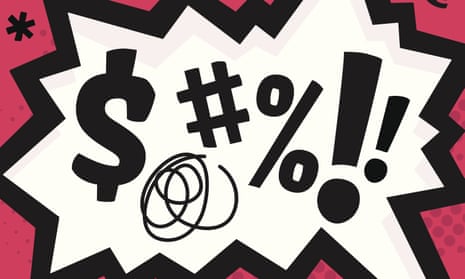Mark Twain wrote: “There ought to be a room in every house to swear in,” because “it’s dangerous to have to repress an emotion like that”. Today, the great American novelist might have applauded the increase in cursing, with a new study identifying a “dramatic” increase in swear words in American literature over the last 60 years.
Sifting through text from almost 1m books, the study found that “motherfucker” was used 678 times more often in the mid-2000s than the early 1950s, occurrences of “shit” multiplied 69 times, and “fuck” was 168 times more frequent.
Led by Jean Twenge, author and psychology professor at San Diego State University, the team analysed the titles making up the Google Books corpus of American English books published between 1950 and 2008, looking for uses of the words “shit”, “piss”, “fuck”, “cunt”, “cocksucker”, “motherfucker”, and “tits”. They picked these words because they were described as the “seven words you can never say on television” by comedian George Carlin in 1972.
Overall, they found that writers were “significantly more likely to use each of the seven swearwords in the years since 1950”, with books published in 2005-2008 28 times more likely to include swearwords than books published in the early 1950s.
“I had guessed that the use of swearwords would increase, but I was surprised that the increase was so large – 28 times more,” Twenge said.
The paper, which has just been published in the journal Sage OPEN, says: “American culture increasingly values individual self-expression and weaker social taboos, and these trends are manifested in the increasing use of swearwords.”
Twenge said: “The increase … happened at the same time that the culture increasingly promoted self-expression and individualism. Individualism is a cultural system that emphasises the self more and social rules less. So as social rules fell by the wayside, and people were told to express themselves, swearing became more common. I think this cultural lens is the best way to view it, rather than as bad or good.”
Last year’s Man Booker prize winner, The Sellout, by American novelist Paul Beatty, nonetheless managed to shock a number of book reviewers because of the sheer volume of expletives inside, including more than 80 instances of fuck and more than 90 uses of the n-word.
Jenni Fagan, whose acclaimed debut novel The Panopticon was highlighted by Guardian readers as an example of writing made richer by the inclusion of swearing, felt the rise in literary profanity was only positive.
“Perhaps it will help us move on from the idea of literature as a solely elite form - unaccountable to the truth, plurality and diversity of real life,” said Fagan, who was named one of Granta’s Best of Young British Novelists in 2013.
“Literature began as epistolary novels,” she said. “The word novella means to make new. In the early 18th-century, novels were considered amoral and suspicious. They had to prove themselves as a form of moral guidance. Art has evolved since then. Life contains swearing. Of course if it fits a character’s identity in a novel, it should be there too.”
Twenge and her fellow authors, graduate student Hannah Van Landingham and University of Georgia psychology professor W Keith Campbell, link the rise of profanities in US literature to the increasingly individualistic nature of the country’s culture, as well as the relaxation of societal taboos.
“One key factor may be self-expression. Swearwords allow the free expression of emotion, especially anger. Due to the greater valuation of the rights of the individual self, individualistic cultures favour more self-expression in general and allow more expression of personal anger in particular,” they write. “Thus, a more individualistic culture should be one with a higher frequency of swearword use.”

Comments (…)
Sign in or create your Guardian account to join the discussion